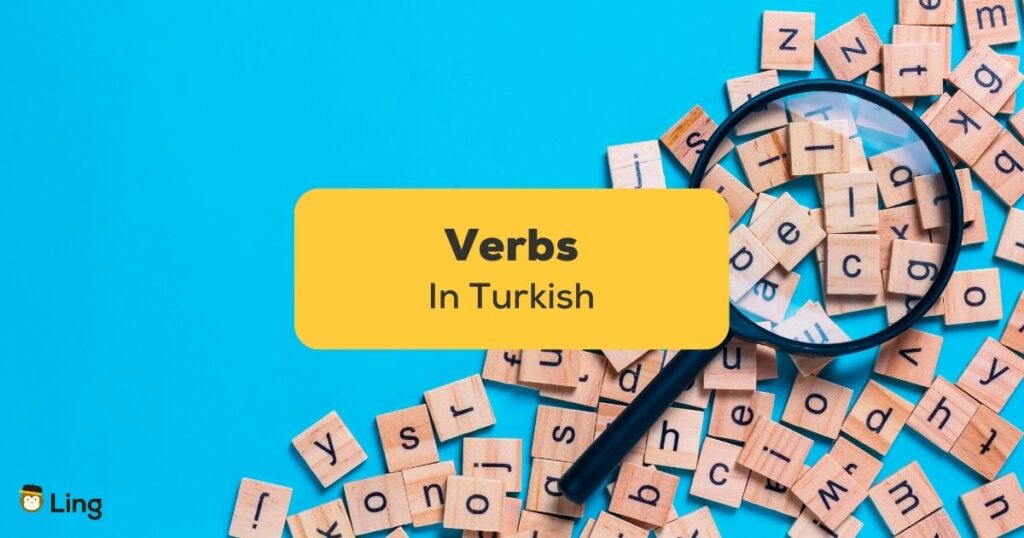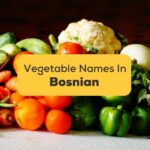If you’ve already known the basic Turkish phrases, why don’t you challenge yourself to learn Turkish verbs? Don’t worry; we’ll start with only fifty of them for now.
So, you’ve started learning Turkish, which is harika! You’ve probably learned basic Turkish words and think it’s time to learn more challenging things like Turkish verbs. But not sure where to start?
We’ve collected the fifty most frequently used Turkish verbs in this blog post and touched upon grammar-related areas, like showing their Turkish verb conjugation.
Are you ready to move your Turkish to the next level? Let’s start then!
Page Contents:
- Verb Types In Turkish
- Infinitive Form In Turkish Verbs
- How To Make Verbs Negative In Turkish?
- Does Turkish Have An Auxiliary Verb?
- The 50 Most Frequently Used Turkish Verbs
- Learn Turkish With Ling App!
Verb Types In Turkish
There are two kinds of verbs in Turkish: the transitive verb and the intransitive verb.
Transitive verbs: A transitive verb is a verb that requires an object to receive the action. Such as to understand, love, find, take, etc.
- Ben seni anlıyorum. – I understand you. (object: you)
- Anahtarı buldum. – They found the key. (object: key)
Intransitive verbs: An intransitive verb is a verb that indicates a complete action without being accompanied by an object. Such as to laugh, sleep, die, etc.
Infinitive Form In Turkish Verbs
Let’s start with the infinitive form. First of all, do you know what an infinitive verb is? An infinitive verb is basically the base form of a verb without an inflection binding it to a particular subject or tense.
If you ever leafed through a printed bilingual dictionary, you’ll see the words in the infinitive form.
If you want to make a Turkish verb infinitive, you should add “-mak/-mek” into the verb root. See the examples below:
How To Make Verbs Negative In Turkish?
Another thing you must know is the negative verb infinitives in Turkish. In this case, the verb root is followed by the negative suffix “-ma/-me” based on the vowel harmony rules. Please check out the negative verb examples below to understand them better.
- Yapmamak (Yap-ma-mak) – Not to do
- Almamak (Al-ma-mak) – Not to take
- Gitmemek (Git-me-mek) – Not to go
- Öğrenmemek (Öğren-me-mek) – Not to learn
Does Turkish Have An Auxiliary Verb?
You may wonder why Turkish doesn’t use auxiliary verbs as much as English does. The answer is simple: Turkish doesn’t need auxiliary verbs. Because it’s an agglutinative language with different Turkish suffixes for each function.
However, there is only one auxiliary verb in Turkish: “olmak.” Though its range of use is pretty limited.
The 50 Most Frequently Used Turkish Verbs
Here, I’ve prepared a list of fifty common Turkish verbs with different personal endings according to Turkish’s present continuous tense (or present tense). If you have no idea about personal pronouns in Turkish, check out my previous blog post and make sure you learned them. It is an essential subject as personal suffixes are shaped in line with the pronouns.
1. Yapmak
Meaning: To make, to do.
- Ben yapıyorum (I do)
- Biz yapıyoruz (we do)
- Sen yapıyorsun (you do)
- Siz yapıyorsunuz (you do)
- O yapıyor (he/she/it does)
- Onlar yapıyorlar (they do)
2. Gitmek
Meaning: To go.
- Ben gidiyorum
- Biz gidiyoruz
- Sen gidiyorsun
- Siz gidiyorsunuz
- O gidiyor
- Onlar gidiyorlar
3. Gelmek
Meaning: To come.
- ben geliyorum
- biz geliyoruz
- sen geliyorsun
- siz geliyorsunuz
- o geliyor
- onlar geliyorlar
4. Almak
Meaning: To take, to buy, to get.
- ben alıyorum
- biz alıyoruz
- sen alıyorsun
- siz alıyorsunuz
- o alıyor
- onlar alıyorlar
5. İstemek
Meaning: To want.
- ben istiyorum
- biz istiyoruz
- sen istiyorsun
- siz istiyorsunuz
- o istiyor
- onlar istiyorlar
6. Çalışmak
Meaning: To work.
- ben çalışıyorum
- biz çalışıyoruz
- sen çalışıyorsun
- siz çalışıyorsunuz
- o çalışıyor
- onlar çalışıyorlar
7. Bilmek
Meaning: To know
- ben biliyorum
- biz biliyoruz
- sen biliyorsun
- siz biliyorsunuz
- o biliyor
- onlar biliyorlar
8. Konuşmak
Meaning: to speak
- ben konuşuyorum
- biz konuşuyoruz
- sen konuşuyorsun
- siz konuşuyorsunuz
- o konuşuyor
- onlar konuşuyorlar
9. Okumak
Meaning: to read, to study.
- ben okuyorum
- biz okuyoruz
- sen okuyorsun
- siz okuyorsunuz
- o okuyor
- onlar okuyorlar

10. Sevmek
Meaning: to like, to love.
- ben seviyorum
- biz seviyoruz
- sen seviyorsun
- siz seviyorsunuz
- o seviyor
- onlar seviyorlar
11. Demek
Meaning: to say, to mean.
- ben diyorum
- biz diyoruz
- sen diyorsun
- siz diyorsunuz
- o diyor
- onlar diyorlar
12. Düşünmek
Meaning: to think, to consider.
- ben düşünüyorum
- biz düşünüyoruz
- sen düşünüyorsun
- siz düşünüyorsunuz
- o düşünüyor
- onlar düşünüyorlar
13. Yemek
Meaning: to eat.
- ben yiyorum
- biz yiyoruz
- sen yiyorsun
- siz yiyorsunuz
- o yiyor
- onlar yiyorlar
14. İçmek
Meaning: to drink
- ben içiyorum
- biz içiyoruz
- sen içiyorsun
- siz içiyorsunuz
- o içiyor
- onlar içiyorlar
15. Başlamak
Meaning: to begin, to start
- ben başlıyorum
- biz başlıyoruz
- sen başlıyorsun
- siz başlıyorsunuz
- o başlıyor
- onlar başlıyorlar
16. Olmak
Meaning: to be, to become, to happen.
- ben oluyorum
- biz oluyoruz
- sen oluyorsun
- siz oluyorsunuz
- o oluyor
- onlar oluyorlar
17. Söylemek
Meaning: to say, to sing.
- ben söylüyorum
- biz söylüyoruz
- sen söylüyorsun
- siz söylüyorsunuz
- o söylüyor
- onlar söylüyorlar
18. Yatmak
Meaning: to lie down, to go to bed.
- ben yatıyorum
- biz yatıyoruz
- sen yatıyorsun
- siz yatıyorsunuz
- o yatıyor
- onlar yatıyorlar
19. Oturmak
Meaning: to sit, to live.
- ben oturuyorum
- biz oturuyoruz
- sen oturuyorsun
- siz oturuyorsunuz
- o oturuyor
- onlar oturuyorlar

20. Sormak
Meaning: to ask
- ben soruyorum
- biz soruyoruz
- sen soruyorsun
- siz soruyorsunuz
- o soruyor
- onlar soruyorlar
21. Vermek
Meaning: to give.
- ben veriyorum
- biz veriyoruz
- sen veriyorsun
- siz veriyorsunuz
- o veriyor
- onlar veriyorlar
22. Görmek
Meaning: to see
- ben görüyorum
- biz görüyoruz
- sen görüyorsun
- siz görüyorsunuz
- o görüyor
- onlar görüyorlar
23. Anlamak
Meaning: to understand
- ben anlıyorum
- biz anlıyoruz
- sen anlıyorsun
- siz anlıyorsunuz
- o anlıyor
- onlar anlıyorlar
24. Anlatmak
Meaning: to tell
- ben anlatıyorum
- biz anlatıyoruz
- sen anlatıyorsun
- siz anlatıyorsunuz
- o anlatıyor
- onlar anlatıyorlar
25. Bağırmak
Meaning: to shout
- ben bağırıyorum
- biz bağırıyoruz
- sen bağırıyorsun
- siz bağırıyorsunuz
- o bağırıyor
- onlar bağırıyorlar
26. Bakmak
Meaning: to look
27. Beklemek
Meaning: to wait
- ben bekliyorum
- biz bekliyoruz
- sen bekliyorsun
- siz bekliyorsunuz
- o bekliyor
- onlar bekliyor
28. Bitirmek
Meaning: to finish
- ben bitiriyorum
- biz bitiriyoruz
- sen bitiriyorsun
- siz bitiriyorsunuz
- o bitiriyor
- onlar bitiriyorlar
29. Bulmak
Meaning: to find
- ben buluyorum
- biz buluyoruz
- sen buluyorsun
- siz buluyorsunuz
- o buluyor
- onlar buluyorlar

30. Çalmak
Meaning: to play an enstrument, to steal
- ben çalıyorum
- biz çalıyoruz
- sen çalıyorsun
- siz çalıyorsunuz
- o çalıyor
- onlar çalıyorlar
31. Cevap vermek
Meaning: to answer
- ben cevap veriyorum
- biz cevap veriyoruz
- sen cevap veriyorsun
- siz cevap veriyorsunuz
- o cevap veriyor
- onlar cevap veriyorlar
32. Yardım etmek
Meaning: to help
- ben yardım ediyorum
- biz yardım ediyoruz
- sen yardım ediyorsun
- siz yardım ediyorsunuz
- o yardım ediyor
- onlar yardım ediyorlar
33. Öğretmek
Meaning: to teach
- ben öğretiyorum
- biz öğretiyoruz
- sen öğretiyorsun
- siz öğretiyorsunuz
- o öğretiyor
- onlar öğretiyorlar
34. Ziyaret etmek
Meaning: to visit
- ben ziyaret ediyorum
- biz ziyaret ediyoruz
- sen ziyaret ediyorsun
- siz ziyaret ediyorsunuz
- o ziyaret ediyor
- onlar ziyaret ediyorlar
35. Planlamak
Meaning: to plan
- ben planlıyorum
- biz planlıyoruz
- sen planlıyorsun
- siz planlıyorsunuz
- o planlıyor
- onlar planlıyorlar
36. Oynamak
Meaning: to play
- ben oynuyorum
- biz oynuyoruz
- sen oynuyorsun
- siz oynuyorsunuz
- o oynuyor
- onlar oynuyorlar
37. Unutmak
Meaning: to forget
- ben unutuyorum
- biz unutuyoruz
- sen unutuyorsun
- siz unutuyorsunuz
- o unutuyor
- onlar unutuyorlar
38. Açmak
Meaning: to open, to turn on
- ben açıyorum
- biz açıyoruz
- sen açıyorsun
- siz açıyorsunuz
- o açıyor
- onlar açıyorlar
39. Kapatmak
Meaning: to close, to shut down, to turn off
- ben kapatıyorum
- biz kapatıyoruz
- sen kapatıyorsun
- siz kapatıyorsunuz
- o kapatıyor
- onlar kapatıyorlar
40. Yalan söylemek
Meaning: to lie
- ben yalan söylüyorum
- biz yalan söylüyoruz
- sen yalan söylüyorsun
- siz yalan söylüyorsunuz
- o yalan söylüyor
- onlar yalan söylüyorlar

41. Fotoğraf çekmek
Meaning: to take a photo
- ben fotoğraf çekiyorum
- biz fotoğraf çekiyoruz
- sen fotoğraf çekiyorsun
- siz fotoğraf çekiyorsunuz
- o fotoğraf çekiyor
- onlar fotoğraf çekiyorlar
42. Gülmek
Meaning: to laugh
- ben gülüyorum
- biz gülüyoruz
- sen gülüyorsun
- siz gülüyorsunuz
- o gülüyor
- onlar gülüyorlar
43. Yıkamak
Meaning: to wash
- ben yıkıyorum
- biz yıkıyoruz
- sen yıkıyorsun
- siz yıkıyorsunuz
- o yıkıyor
- onlar yıkıyorlar
44. Uyumak
Meaning: to sleep
- ben uyuyorum
- biz uyuyoruz
- sen uyuyorsun
- siz uyuyorsunuz
- o uyuyor
- onlar uyuyorlar
45. Uyanmak
Meaning: to wake up
- ben uyanıyorum
- biz uyanıyoruz
- sen uyanıyorsun
- siz uyanıyorsunuz
- o uyanıyor
- onlar uyanıyorlar
46. Tanışmak
Meaning: to meet someone
- ben tanışıyorum
- biz tanışıyoruz
- sen tanışıyorsun
- siz tanışıyorsunuz
- o tanışıyor
- onlar tanışıyorlar
47. Buluşmak
Meaning: to meet with someone
- ben buluşuyorum
- biz buluşuyoruz
- sen bulşuyorsun
- siz buluşuyorsunuz
- o buluşuyor
- onlar buluşuyorlar
48. Denemek
Meaning: to try
- ben deniyorum
- biz deniyoruz
- sen deniyorsun
- siz deniyorsunuz
- o deniyor
- onlar deniyorlar
49. Hissetmek
Meaning: to feel
- ben hissediyorum
- biz hissediyoruz
- sen hissediyorsun
- siz hissediyorsunuz
- o hissediyor
- onlar hissediyorlar
Learn Turkish With Ling App!
Want to learn even more Turkish verbs? Then, waste no more time and check out the Ling App to start your Turkish lessons at home today!

Ling is a language-learning app designed to assist all language learners from beginning their language-learning journeys. The app consists of different engaging activities, from writing and listening exercises to an AI chatbot to practice your speaking skills, and with much more, the Ling App offers you everything you’re looking for in a language learning app.
Also, don’t forget to check out our Turkish blog for weekly articles about the Turkish language and culture!
Trust me; you won’t regret it if you try Ling for FREE by downloading it from the App Store or Play Store.
Until next time! Görüşmek üzere!




































































One Response
Thanks for this article on the 50 most common verbs in Turkish. Maybe, I missed it, but this article to me would be much more useful if if were available in the form of a PDF File. Yes, it can be saved as is, but the resultant file is for me at least less accessible and useful.